|
One Hundred
Tamils of the 20th Century
V.O. Chidambaram Pillai
(VOC)
வ. உ.
சிதம்பரம்
பிள்ளை
(வ.
உ.சி)
Kappalottiya Tamilan: கப்பலோட்டிய
தமிழன்
1872 - 1936
[see also Kappal Oddiya Thamilan:
The Overseas Exploits of the Thamils & the
Tragedy of Sri Lanka]
"V.O.C. showed
the way for organized effort and sacrifice. He
finished his major political work by 1908, but
died in late 1936, the passion for freedom still
raging in his mind till the last moment. He was
known as "Chekkiluththa Chemmal" - a great man
who pulled the oil press in jail for the sake of
his people. He was an erudite scholar in Tamil, a
prolific writer, a fiery speaker a trade union
leader of unique calibre and a dauntless freedom
fighter. His life is a story of resistance,
strife, struggle, suffering and sacrifice for the
cause to which he was committed.."
[Please also see discussion
re 'what do the initials V.O.C. stand
for?]
V.O.Chidambarampillai (VOC) was born on 5
September 1872 in Ottapidaram, Tirunelveli district
of Tamil Nadu (the same District which a hundred
years earlier given birth to Veerapandiya Kattabomman).
Chidambarampillai was the eldest son of
Ulaganathan Pillai and Paramayi Ammai. His early
education was in Tuticorin. He passed a pleadership
examination in 1894 and this enabled him to
practise law at the local sub-magistrate's court.
He then went on to practise at the nearby port town
of Tuticorin.
The partition of Bengal in 1905, the rise of
militancy evidenced by Swadeshi (boycott of
foreign goods) movement, saw Chidambarampillai
taking a direct interest in the political struggle.
These were the years before the arrival of Gandhi
on the Indian political landscape.
Chidambarapillai supported Bal Gangadhar Tilak and the
militant wing of the Indian National Congress. He
participated in the 1907 Surat Congress together
with Subramania Bharati. He was
one of the earliest to start the 'Dharmasangha
Nesavuchalai' for hand-loom industry and the
'Swadeshi Stores' for the sale of India made things
to the people. He played a lead role in many
institutions, like the "National Godown," "Madras
Agro-Industrial Society Ltd.," and "The Desabimana
Sangam".
Commerce between Tuticorin and Colombo was the
monopoly of the British India Steam Navigation
Company (BISN) and its Tuticorin agents, A.
& F. Harvey.
Inspired by the Swadeshi movement, V.O.C.
mobilised the support of local merchants, and
launched the first indigenous Indian shipping
enterprise, the Swadeshi Steam Navigation Company,
thus earning for himself the name - "Kappalottiya
Tamilan கப்பலோட்டிய
தமிழன்".
The Swadeshi Steam Navigation Company was
registered on the 12th of November 1906. He
purchased two steamships, S.S. Gallia and S.S.
Lawoe for the company and commenced regular
services between Tuticorin and Colombo against the
opposition of the British traders and the Imperial
Government.
His efforts to widen the base of the Swadeshi
movement, by mobilising the workers of the Coral
Mills (also managed by A. & F. Harvey) brought
him into increasing conflict with the British Raj.
On 12 March1908, he was arrested on charges of
sedition and for two days, Tirunelveli and Tuticorin witnessed unprecedented
violence, quelled only by the stationing of a
punitive police force. But newspapers had taken
note of VOC. Aurobindo Ghosh, acclaimed him in
Bande Mataram (March 27, 1908) -
"
Well Done,
Chidambaram! A true feeling of comradeship is
the salt of political life; it binds men together
and is the cement of all associated action. When
a political leader is prepared to suffer for the
sake of his followers, when a man, famous and
adored by the public, is ready to remain in jail
rather than leave his friends and fellow-workers
behind, it is a. sign that political life in
India is becoming a reality. Srijut Chidambaram
Pillai has shown throughout the Tuticorin affair
a loftiness of character, a practical energy
united with high moral idealism which show that
he is a true Nationalist. His refusal to
accept release on bail if his fellow-workers were
left behind, is one more count in the
reckoning. Nationalism is or ought to be not
merely a political creed but a religious
aspiration and a moral attitude. Its business is
to build up Indian character by educating it to
heroic self-sacrifice and magnificent ambitions,
to restore the tone of nobility which it has lost
and bring back the ideals of the ancient Aryan
gentleman. The qualities of courage, frankness,
love and justice are the stuff of which a
Nationalist should be made. All honour to
Chidambaram Pillai for having shown us the first
complete example of an Aryan reborn, and all
honour to Madras which has produced such a
man."
Apart from the Madras press, even the Amrita
Bazaar Patrika from Kolkata (Calcutta) carried
reports of his prosecution every day. Funds were
raised for his defence not only in India but also
by the Tamils in South Africa. Bharathy gave
evidence in the case which had been instituted
against him. V.O.C. was confined in the Central
Prison, Coimabtore from 9 July 1908 to 1 December
1910.
The Court imposed a sentence of two life
imprisonments (in effect 40 years). The sentence
was perhaps a reflection of the fear that the
British had for VOC and the need to contain the
rebellion and secure that others would not follow
in Chidambarampillai's footsteps.
In 1911, Tirunelveli District Collector Ashe was
assasinated by Vanchinathan, a youth trained by
V.V.S.Aiyar who had at that time had
sought refuge in French Pondicherry. The British
response was brutal and a witch hunt followed. And
the Swadeshi movement petered out with many of its
activists languishing in jail.
VOC in prison, was left to fend for himself. His
wife, Meenakshi Ammal, followed him from the
Tirunelveli sub jail to the Coimbatore and Kannur
central jails, where he spent his term and almost
single-handedly organised his appeals.
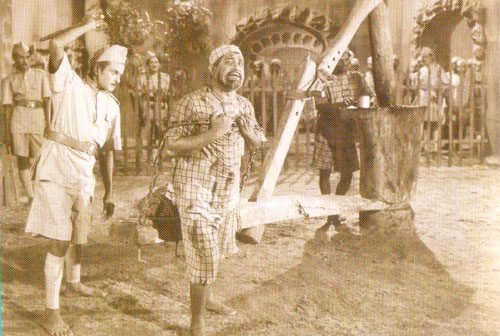
Sivaji Ganesan as VOC in
prison
in the film Kappalottiya
Thamizhan
Chidambarampillai was not treated as a
'political prisoner'. The sentence that was imposed
on him was not 'simple imprisonment'. He was
treated as a convict sentenced to life imprisonment
and required to do hard labour. He was "yoked
to the oil press like an animal and made to work it
in the cruel hot sun..." writes, historian and
Tamil scholar, R. A. Padmanabhan. Sivaji
Ganesan's portrayal of VOC in the film Kappalottiya Thamizhan
reflected that agony and that pain.
"Among the 300 films which was Sivaji's
favourite? Pat came the answer from Sivaji,
'Kappalottiya Thamizhan''. Enacting a doctor, an
engineer and others are not very difficult. But
to portray a person, a revered freedom fighter,
whom people had met, seen and moved with, is a
different proposition. So when the late Panthulu
asked me to enact the role, I first hesitated.
Then I decided to meet the challenge. I got all
the material on V. O. Chidambaram Pillai and
studied it. 'On seeing the film, I cried, not
because my performance was moving but because it
hit me with new impact - the sacrifice VOC and
others had made for the country. When VOC's son
Subramaniam said that he saw his father come
alive on the screen, I considered it the highest
award.'' Sivaji Ganesan on his Role in
Kappalottiya Tamilan
Subramania Bharati was moved to write his
வ.உ.சி.க்கு
வாழ்த்து.
வேளாளன்
சிறைபுகுந்தான்
தமிழகத்தார்
மன்னனென
மீண்டான்
என்றே
கேளாத
கதைவிரைவிற்
கேட்பாய்
நீ
வருந்தலைஎன்
கேண்மைக்கோவே!
தாளாண்மை
சிறினுகொலோ
யாம்புரிவேம்
நீஇறைக்குத்
தவங்கள்
ஆற்றி,
வேளாண்மை
நின்
துணைவர்
பெறுகெனவே
வாழ்த்துதிநீ
வாழ்தி!
வாழ்தி!
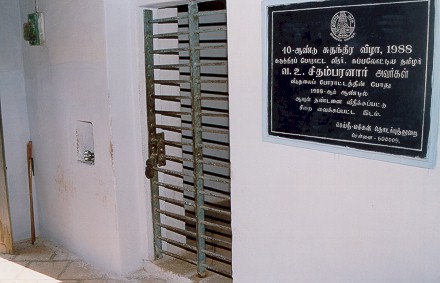
The Prison Cell that V.O.C.
occupied in Central Prison Coimbatore
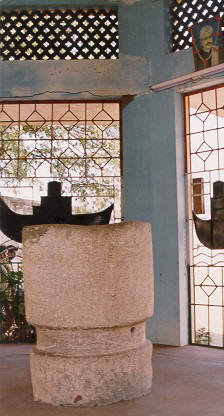 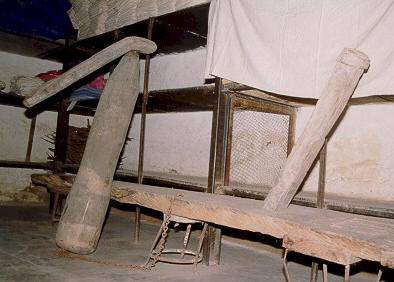
"yoked to the oil press like an
animal.."
In prison VOC continued a
clandestine correspondence, maintaining a stream of
petitions going into legal niceties. When he
stepped out of prison in late December 1912, after
a high court appeal had reduced his prison
sentence, the huge crowds present on his arrest
were conspicuously absent. His feelings may have
been similar to those of Aurobindo in 1909 -
feelings which Aurobindo expressed in in
the famous Uttarpara speech, soon after his own
release from prison:
"It is I, this time who have spent one year in
seclusion, and now that I come out I find all
changed. One who always sat by my side (Tilak)
and was associated in my work is a prisoner in
Burma; another is in the north rotting in
detention... I looked around for those to whom I
had been accustomed to look for counsel and
inspiration. I did not find them. There was more
than that. When I went to jail the whole country
was alive with the cry of Bande Mataram... when I
came out of jail I listened for that cry, but
there was instead a silence. a hush had fallen on
the country and men seemed bewildered... No man
seemed to know which way to move, and from all
sides came the question, 'What shall we do next?
What is there that we can do?' I too did not know
which way to move, I too did not know what was
next to be done."
VOC was not permitted to remain in his native
Tirunelveli district and he moved to Chennai with
his wife and two young sons. Having been convicted
for sedition, he had lost his pleadership status
and he was unable to earn his livelihood by
practising the law. The Swadeshi Steam Navigation
Company had collapsed. It was liquidated in 1911.
He and his family had lost all their wealth and
property in his legal defence.
After his release in 1912 he completed his
autobiography which he had started writing in
prison. It was in Tamil in a verse form. He wrote a
commentary on Thirukural and edited the Tamil work
of grammar, Tolkappiam. He authored a few novels
in Tamil. His translation of some of James Allen's books earned
him an indisputable reputation of being an erudite
Tamil scholar. His Tamil works like "Meyyaram" and
"Meyyarivu" reflect a creative mind, restless for
uninhibited expression. V.O.C. attended the
Calcutta Congress in 1920.V.O.C. showed the way for
organized effort and sacrifice. Today when anybody
utters the name of VOC, immediately comes to mind
is his achievement as the first Indian to launch a
ship service.
"The moment anybody
utters the name of VOC, immediately comes to mind
is his achievement as the first Indian to launch
a ship service between Tuticorin and Colombo
through Swadeshi Steam Navigation Company in the
interest of the Nation's economy, and that too,
against the British Rule. His main aim was to
serve the country for attaining Independence from
the British and he had all the leadership
qualities in him that require achieving things in
macro level. He gained the patronage from leading
merchants and industrialists in Tirunelveli for
establishing a Swadeshi Merchant Shipping
Organization, which was unveiled on 16th October
1906. From then on, the company developed from
strength to strength and laid its name strongly
in the minds of everyone in Indian and foreign
countries as well." Chennai School of
Ship Management
"The nation will always remember V. O.
Chidambaram Pillai, whose 130th birth anniversary
was on 5 September 2001, principally for the
pioneering role he played in building India's
swadeshi shipping industry." VOC - the Doyen of Swadeshi
Shipping - S.Dorairaj, 2001
On the 5th September, 1972, on the occasion of
VOC's birth centenary the
Indian Posts & Telegraphs department issued a
special postage stamp. The citation read
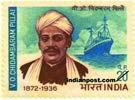 "...His courage and determination to run
the Swadeshi Steam Navigation Company against the
stern opposition of the British traders and the
Imperial Governmentwon the proud acclaim of one
and all..." "...His courage and determination to run
the Swadeshi Steam Navigation Company against the
stern opposition of the British traders and the
Imperial Governmentwon the proud acclaim of one
and all..."
VOC finished his major political work by 1908,
but died in late 1936, the passion for freedom
still raging in his mind till the last moment.
He was known as
"Chekkiluththa Chemmal" - a great man who pulled
the oil press in jail for the sake of his people.
He was an erudite scholar in Tamil, a prolific
writer, a fiery speaker a trade union leader of
unique calibre and a dauntless freedom fighter. His
life is a story of resistance, strife, struggle,
suffering and sacrifice for the cause to which he
was committed. In accordance with his wishes, VOC
was taken to the Congress Office at Tuticorin,
where he died on the 18th November, 1936.
 .A.
R. Venkatachalapathy in the Hindu 26 January
2003 .A.
R. Venkatachalapathy in the Hindu 26 January
2003
on the Exchange of Letters between V.O.
Chidambaram Pillai and M.K.Gandhi
Between
the middle of 1915 and early 1916, Gandhi exchanged
a series of letters with a personality whose name
does not occur even once in the 100-volume
Collected Works of Mahatma Gandhi. The person in
question is V.O. Chidambaram Pillai (or VOC), who
between 1906-08 during the Swadeshi movement,
dominated the national movement in Tamil Nadu.
Gandhi was not yet the Mahatma then. Fresh from
decades-long political activity in South Africa,
Gandhi was still finding his feet, politically. He
had arrived in Chennai on April 17, 1915, along
with his wife, Kasturba. The couple stayed at 60,
Thambu Chetty Street (George Town), the residence
of G.A. Natesan, the nationalist publisher. He was
to stay in Chennai (Madras) for three weeks before
setting out for Ahmedabad on May 8....
.... A correspondence which began at this
juncture between VOC and Gandhi continued for about
six months, which is our present concern. We do not
know what happened to the enormous mail Gandhi
received. But VOC seems to have preserved all these
letters, and for good measure, had written his
draft replies on Gandhi's letters. So we have his
side too. The lines he had scribbled out in his
draft letters add to our knowledge - amply
rewarding for the task of decipherment.
The first letter, drafted probably a day after
Gandhi arrived, addressed Gandhi as "Dear Brother":
"I have had the fortune of seeing you and my
respected Mrs Gandhi when you came out of the
Railway compound the other evening", it said and
added, "I want to have a private interview with you
at any time convenient to you before you leave this
place". Gandhi replied promptly with a single line
on April 20, 1915: "If you kindly call at ... 6
A.M. next Friday, I could give you a few
minutes".
Switching over to a more formal "Dear Sir", VOC
replied the next day: Underlining the words "a few
minutes", he said, "As I am afraid that my
conversation with you will take more than the
allotted `a few minutes', I need not trouble you
with my presence". He excused himself "for having
intruded upon your precious time".
It was now Gandhi's turn to take mild offence:
"If you do not want to see me I would like to see
you myself. Will you kindly call on Friday or
Saturday at 6 A.M. and [sic?] give me a few
minutes?" He then went on to explain: "Of course
you can call any day between 3 p.m. and 4 p.m. when
I am open to be seen by anybody. But as you wanted
a private interview I suggested Friday morning as I
suggest some morning or the other for private
interviews". (April 21, 1915)
Here came the first poignant moment in the
exchange. VOC agreed to meet Gandhi early in the
morning but said, "I cannot reach your place before
6:30 a.m." Reason: "the tram car, the only vehicle
by which I can now afford to go to your place,
leaves Mylapore after 5:30 in the morning". A man
who had bought up two steamships a few years
earlier was now unable to take anything more than a
tram! Yet VOC went on to add, "I can spend not `a
few minutes' but, the whole of my lifetime with the
patriots of my country if they wish me to do so.
All my time is intended for the services of my
country and of its patriots. Only after these two,
God is attended to by me".
Gandhi and VOC did indeed meet. But whether VOC
took only a tram or whether they met only for "a
few minutes" we will never know. But the
correspondence did not end here. It followed the
issue Gandhi himself raised in his letter of April
21, 1915.
"I would like to know from you whether you
received some moneys from me which were collected
on your behalf some years ago in South Africa. I
was trying to trace some orders which I had
thought were sent, but I did not find them. I
therefore would like to know from you whether you
received the moneys that were handed to me."
VOC replied (April 22, 1915) that neither he nor
his wife had received any money. The reference to
his wife and the indication by Gandhi to money
collected "some years ago" suggest that it may have
had to do with the fund raised in South Africa for
VOC's defence.
(In two waves of migration from India, 1860-1866
and 1874-1911, Tamils had reached South Africa most
often as indentured labourers. Even in 1980, Tamils
constituted 37 per cent of the population, the
largest group among people of Indian origin. (A
collection of Bharati's poems, "Matha
Manivachagam", had been published in Durban in
1914. Gandhi's links with this segment of the
diaspora needs no recounting.) However, despite his
impecunious situation, he reassured Gandhi: "But,
if you will pardon me, I will say that you need not
trouble yourself ... for I am sure that it would
have gone to a better purpose".
Gandhi would of course have none of it. "I don't
know the names of those who subscribed for you but
the money was given to me by a friend on their
behalf and I have been always under the impression
that it was sent to you".
Now comes the most poignant letter. VOC replied
saying that he had presumed from Gandhi's earlier
letter that the fund had been spent towards Passive
Resistance in South Africa and, therefore, he had
asked him not to bother to remit the money
especially if it was to be from his funds. But now
that Gandhi had made it clear that it was not
so:
"I will, in my present condition, be only glad
to receive that money ... I have already told you
in person that my family and I are supported for
the past two years or so by some South African
Indians ... Such being the case, there is no reason
why I should say that the money intended for me and
that is ready to be given to me is not wanted by
me. Under the present circumstances if I refuse
that amount I will be committing a wrong to myself
and my family".
Now that the issue was settled - that Gandhi
indeed owed money, and VOC was not averse to
receiving it - a series of letters were exchanged
from late May 1915 until January 1916. To VOC's
apparently long letters, Gandhi replied on cryptic
post cards.
On May 28, 1915 Gandhi assured VOC: "I shall now
send for the book subscribed in Natal. I don't know
the amount nor the names. But I hope to get them".
VOC seems to have been in desperate need of money.
"Don't you know at least approximately the total
amount given to you by your friend? If you know it,
can you not send me that amount or a major portion
of it now, so that it may be useful to me in my
present difficult circumstances? The remainder you
may send to me after you get the books", VOC
pleaded (May 31, 1915). He also asked for the names
of benefactors. In letter after letter he asked for
these details.
It is understandable, given VOC's penchant for
remembering benefactors by naming his children for
them: Vedavalli was named for T. Vedia Pillai who
supported him and Subramaniam for C.K. Subramania
Mudaliar, who helped him during his prosecution.
Even the Englishman E.H. Wallace, who first
committed his case to the session's court but was
instrumental in getting his sanad back, was
remembered in the name of his last son,
Wallacewaran!
But Gandhi would only say, "If you will kindly
wait a while, you will have both the money and the
particulars. If I knew the name of the friend, I
should certainly let you know", and asked VOC to
write to Mr. Patak at Johannesburg for more
details.
Probably to another reminder from VOC, asking if
he had heard from South Africa, Gandhi wrote a
rather curt "Not yet, yours M.K. Gandhi" without
even a formal word of address (July 23, 1915). But
within a month, most certainly to another reminder
from VOC, Gandhi wrote with his own hand, in Tamil,
saying he had not yet heard from South Africa.
(This particular post card is in tatters.)
Gandhi writing in Tamil seems to have completely
floored VOC. Dropping the question of money VOC
started off right away, "Your card written in Tamil
reached me on the due date. I am glad to see that
you have written the language without any mistake
whatever. If you are able to read and understand
Tamil prose and poetical works of ordinary style, I
will be glad to send you all my publications"
(September 28, 1915).
However, even in December 1915 and January 1916,
Gandhi was only writing one-line letters like "I am
still awaiting instructions from Natal" to VOC's
increasingly desperate and beseeching letters.
VOC's ordeal came to an end at last when, on
January 20, 1916, Gandhi wrote from Ahmedabad, "I
have now heard from Natal", and that Rs. 347-12-0
was to be remitted to him soon.
The correspondence ends here. VOC was no doubt
relieved and delighted. On February 4, 1916, he
wrote to a friend, in Tamil, "Rs. 347-12-0 has come
from Sriman Gandhi. I have given Rs. 100 to the
pressman for casting new types. With the remaining
money I have settled all my debts except one of
Rs.50. I will need further money only to buy
paper".
Of course, VOC had heaved a sigh of relief too
early. Never really recovering from the penury
caused by his prison life - he tried his hand at
selling provisions, worked as a clerk in Coimbatore
and for a few years after regaining his pleadership
sanad, practised in the Kovilpatti court which by
his own admission was only enough to meet his
"betel leaves and areca nut expenses". This however
did not come much in the way of his public life. As
a die-hard supporter of Tilak, he could never
countenance Gandhi's leadership. Yet, until his
death in 1936, he continued to be active in the
labour movement, the national movement and the non
Brahmin movement. That, however, is a different
story.
 Kappalottiya Tamilan - The
Film
Kappalottiya Tamilan - The
Film
A movie review by Balaji
Balasubramaniam
Cast: Sivaji Ganesan, Gemini Ganesan,
Savitri, S.V.Subbaiya, Rangarao, Asokan, Balaji -
Direction: B.R.Bandulu
Actors rarely identify any one of their movies as
their favorite, instead detouring around the
delicate question by saying that all the movies
they acted in had their strengths. Considering the
sheer number of movies he has acted in, picking a
favorite had to be an even tougher task for
'Sivaji' Ganesan than for most actors. But he had
repeatedly declared Kappalottiya Thamizhan to be
his favorite, stating the difficulty of playing a
famous leader, the research that went into the
movie and its realism as his reasons.
The movie effectively portrays the hardships
undergone by V.O.Chidambaram Pillai, who was
responsible for launching the first Indian ship on
Indian waters.
V.O.Chidambaram Pillai (Sivaji) is a lawyer and
also the owner of a large salt factory. He is a
true patriot, leading the movement to burn all
foreign goods. Noticing that there was no Indian
ship plying in the Indian waters, he collects the
money needed to buy a ship and launches the ship.
He, along with Subramaniam Siva, is arrested for
leading a strike of workers at a mill run by the
English and suffers untold hardship in prison.
Sivaji brings Chidambaram Pillai before our eyes
with his portrayal of the freedom fighter. He is
majestic during the initial portions, as he strides
with confidence, collecting money for buying the
ship and sure of its success in propagating the
freedom movement. He delivers his dialogs
forcefully and with passion and the accompanying
expressions and gestures complement the effect (the
single shot when the collector imagines Sivaji as
Veera Pandiya Katta Bomman is quite exhilarating).
The makeup is flawless in his old age and his slow,
uncertain walk and sad face leave us with little
doubt that we are actually seeing an old man on
screen. It is an underplayed performance but
grandiose nevertheless.
The movie effectively shows us the hardships
undergone by the people in order to gain
independence and makes us admire the patriotic
fervor in the few characters it focusses on.
Chidambaram Pillai's selfless acts are ofcourse the
highlight and the way he sells his business or his
wife's jewels without a moment's thought speaks of
his greatness. There is passion in his voice as he
dreams of an Indian ship. His wealthy lifestyle
makes the hardships he undergoes in jail even more
tragic. The scenes in jail have been picturised
well with even one of the convicts making an
impression with his respect for V.O.C.
But the movie does not focus on him solely with
the effect of making the other characters
insignificant. Bharatiyar's eccentricity and
Subramaniam Siva's forcefulness are well brought
out during their segments. Ofcourse these
characters have their best scenes when seen with
VOC. Subramaniam Siva has his best lines during his
visit to the Collector's office with VOC while
Bharatiyar shines when asked about his association
with VOC in court. Individuals like Gemini
Ganesan's Madasami get substantial screen time and
Vanchinathan manages to impress us in the little
time he is on screen.
Maybe because VOC could not accomplish much
after he came out of jail or because there are no
records of that segment of his life, the portions
of the movie dealing with that part seem rather
rushed. His transformation to an aged man seems
abrupt with only newspaper reports about the death
of his fellow freedom fighters being used to
indicate the passing of time. The last scene is
suitably touching with Bharatiyar's Endru
Thaniyum....
S.V.Subbaiya is perfect as Bharatiyar and his
expressions, gestures and dialog delivery are
superb. Among all the actors who have portrayed the
poet in cinema, no one comes as close as
S.V.Subbaiya. Gemini Ganesan and Savitri have a few
cute lines as the lovebirds. S.V.Rangarao, who
usually plays a benevolent old man, appears as the
British collector here. Asokan too has a role as
the assistant collector. Songs like Velli
Paniyin... and Vande Maataram... are very
memorable.
|